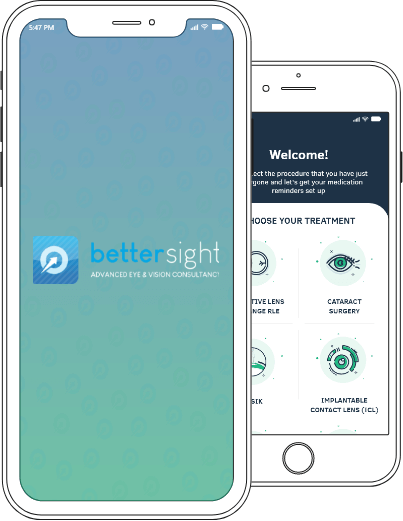

If you have been found unsuitable for Laser vision correction or if you simply prefer a more reversible procedure then Phakic Implantable Contact Lens is the perfect alternative.
or you can download my guide to State of the Art Vision Correction Treatments -2020 and BeyondMr S. Rehman


The desire for becoming free of glasses is often greatest in those who have very high glasses/contact lens prescriptions. For those who are above the age of 50 and suffer from very high prescriptions - Refractive lens exchange is the perfect solution.
But what happens if you are under the age of 50 and you have very high prescriptions?
Many high street and non specialist vision correction providers will often simply ‘shrug their shoulders’ and say ‘we can’t help you’.
But here at Bettersight - we can help you .
Over the last decade or so we have developed a great deal of experience in helping people in these situations. So if you are under 50 and have:
We may be able to consider Phakic Lens implants also sometimes known as ICL’s.
we have access to a range of specialised lens ICL’s which can help to correct your eyesight and minimise or even eliminate your need for glasses or contact lenses.
In people between the ages of 21-50 the natural lens does retain useful function in being flexible enough to allow people to still have useful near sight when wearing their distance glasses. So we at Bettersight would not usually recommend a Refractive lens exchange unless the spectacle prescription was very large/extreme or there were already some early signs of cataract formation.
For large value prescriptions laser vision correction is not usually feasible as too much corneal tissue would require sculpting to correct the prescription. This can lead to unwanted visual aberrations and some decline in vision quality.
For this reason specialised advanced technology lens implants have been developed which are designed to be inserted into the eye and to work in conjunction with your natural lens. In other words a lens implant to correct yours eyesight whilst leaving your own natural lens in place so that natural close visions remains for you.
These marvellous little lens implants are called Phakic lens implants. Our lead surgeon Mr Rehman is fully accredited to offer both major types of Phakic Lens implants currently available in the UK.
Broadly speaking we can elect to insert implants either behind the Iris (the coloured part of the eye) or in front of the iris.
.png)
Implants designed specifically for this position are extremely thin, delicate lenses made from a hydrogel / collamer material. These implants can be inserted under just eyedrop anaesthesia – no injections required ! The procedure takes just 15 minutes for each eye and we can even consider treating both eyes on the same day for people with busy lives who cannot afford too much downtime. The procedure is comfortable and vision recovery starts happening within an hour or two. Many people can enjoy a high level of vision even on the first post operative day.
With over 1000,000 treatments with ICL around the world and with a reported 99% satisfaction rate, there is no doubt that ICL is a strong alternative to Laser vision correction.
As Mr Rehman is highly experienced in both techniques, he can provide clear and unbiased advice about the procedure that’s best suited for you.
Although ICL can often be a perfectly viable option in most patients with myopia, hyperopia and astigmatism, in our experience patients generally prefer to opt for Laser vision correction when both options are suitable. This may be due to the cost difference which favours Laser vision correction.
However some patients simply prefer a procedure which doesn’t remove any tissue from the eye. This concept of a reversible process is a major attraction for some patients considering vision correction treatment.
However, in our experience, in the majority of cases, patients opt for ICL if Laser vision correction is unsuitable. This could be for one of the following reasons:
Significant dry eye problems. Laser vision correction is more likely to aggravate this problem due to changes to the cornea whereas ICL surgery does not aggravate dry eye complaints.
Prescription is outside a safe treatment zone for laser vision correction. Generally where myopia is greater than -10D, hyperopia is greater than 4D or astigmatism is greater than 4D - Laser vision correction may not provide a safe and effective vision correction option. In such cases and where internal eye measurements are adequate to allow ICL implantation, this can be an excellent alternative mode of correction.
Watch the video below which outlines the actual procedure.
These implants can be used in specific circumstances – typically for very extreme prescriptions which may fall out with even the range of corrections offered by the posterior chamber implants. The surgery is often performed under local anaesthetic one eye at a time usually just a week apart.
At Bettersight our surgeon has a long experience of helping people with very extreme prescriptions with lens implants of this type with excellent results. As with all such treatments it all starts with a in depth consultation and multiple scans. We find we can help over 90% of patients who present to us with extreme prescriptions.

Most people seeking vision correction treatment under the age of 50 could be potential candidates for Phakic ICL treatment. There are however a number of criteria that are applied in determining whether you are indeed suitable for ICL treatment related to the internal anatomical dimensions of your eye(s). In general we find ICL is most suited for those patients who have large prescriptions – Myopia over -10D, hyperopia over 4D and Astigmatism over ±4D because prescriptions above these figures tend to be less successfully treatable with Laser vision correction. During your assessment we will help you understand whether ICL is especially suited for you or your lifestyle.
NO – Most patients report the following:
Very few people report any significant discomfort during ICL surgery. Techniques are now highly evolved and the ICL can be inserted through a tiny incision so no stitches are required either! We do suggest a small dose of Diazepam to make the process feel a little less nerve-wracking for you –but this is not mandatory – some people do not feel the need for sedative and that’s also fine.
Yes- because ICL treatment is intrinsically tissue preserving, remember in ICL an Implant is added to the eye to help correct your eye prescription whereas in Laser vision correction small amounts of corneal tissue are removed to bring about the same intended effect. This additive principle also means that ICL is reversible – the only type of vision correction treatment that can effectively be reversed. Reversibility also means that the procedure could be upgradeable in the future. The upgradeability option is perhaps most useful for patients who have high prescriptions and are in their early to mid twenties, an age from which further natural prescription changes may yet occur.
We classify ICL as a very long term solution, but not a lifelong one. This is because as you age, your chances of developing cataract (clouding of your natural crystalline lens) increase. The average age of patients undergoing cataract surgery in the UK is around mid 60’s and we fully expect and hope that patients having ICL treatment in their 20’s and 30’s will still be around in their mid sixties! If Cataract were to develop then its straightforward to have removal of ICL and cataract surgery with a different type of intraocular lens implant inserted as a single 15-20 minute procedure.
No – in my practice, over 99% of patients are treated with nothing more than eye-drop anaesthetic – no needles and no injections either! However, for patients who have profound anxiety or medical conditions which may not allow them to cooperate with the procedure we can certainly consider this option. Please note that our GA service is available only at the Spire Hospital Elland.
No – in my practice, over 99% of patients can be treated successfully and with little or no discomfort with nothing more than eye-drop anaesthetic. I do not find it necessary to use needle injections in any case with modern techniques. In fact one might wonder why some eye surgeons continue to use injections for ICL surgery! something I abandoned over 15 years ago!
Another ‘old wives’ tale from the past – but one that bizarrely continues to linger. NO. ABSOLUTELY NOT – and what’s more it NEVER WAS THE CASE. Your eye remains exactly as it is – rest assured.
No- The NHS – especially post COVID-19 has a major struggle on its hands simply to restore its major services such as elective surgeries, cancer care etc. The NHS has never offered pure vision correction procedures on a routine basis and is extremely unlikely to ever offer such services. We are not aware of any publicly funded healthcare system anywhere in the world which routinely provides elective vision correction surgery services.
Yes – absolutely. We have a very specialised protocol in place at all our sites which allows us to perform same day bilateral surgery in the safest way possible. Here is how we do it,
These measures are not easily performed and only a few select service providers are able to meet my stringent criteria to allow safe delivery of same day Phakic ICL surgery. You can be assured that I and my team leave no stone unturned to provide the safest possible environment for you to have both eyes treated on the same day in this way – if you choose to do so
In a word – Very! – Even with very high prescriptions it is possible to achieve excellent vision correction with ICL treatments. The individual ICL’s are tailor made for your eye prescription (which is why there is sometimes a 4-6 weeks waiting time!). However as with any procedure it is possible that some residual small prescription may remain after ICL – where conditions are appropriate and where it is indicated we will offer Laser vision enhancement to provide the final ‘tweak’ to help maximise the chances of achieving excellent un aided vision. Please note that unless specifically indicated your Laser vision enhancement is complimentary in my service.
Despite a severe retinal tear in danger of imminent detachment, macular problems and very poor sight, 34 year old Ashar Saleem not only... Read more
Total patient support- in the palm of your hand.
